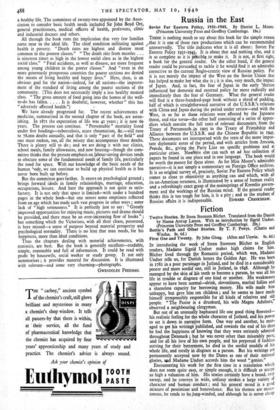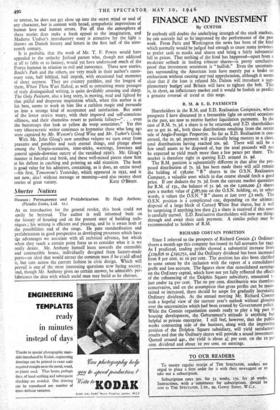Fiction
Twelve Stories. By Steen Steensen Blicher. Translated from the Danish by Hanna Astrup Larsen. With an introduction by Sigrid Undset. (Princeton University Press and Geoffrey Cumberlege. 20s.) First One and Twenty. By John Gloag. (Allen and Unwin. 9s. 6d.) IN introducing the work of Steen Steensen Blicher to English readers, Madame Sigrid Undset makes high claims for him. Blicher lived through the Romantic period, which was, Madame Undset tells us, for Danish letters the Golden Age. He was born in 1782 in a poor parsonage in Jutland, and he died in a considerably poorer and more sordid one, still in Jutland, in 1848. Although he managed by the skin of his teeth to become a parson, he was all his life in trouble or disgrace of one kind or another. His weaknesses appear to have been normal—drink, slovenliness, marital follies and a shameless capacity for borrowing money. His wife made him unhappy, but gave him ten children ; and he seems to have made himself irresponsibly responsible for all kinds of relatives and old people. "The Pastor is a drunkard, his wife Magna Adultera," observed a neighbouring clergyman.
But out of an unusually haphazard life one good thing flowered— his realistic feeling for the whole character of Jutland, and his power to set it down in narrative form. One way and another, he man- aged to get his writings published, and towards the end of his days he had the happiness of knowing that they were seriously admired throughout Denmark ; but he was never other than miserably poor, and for all his love of his own people, and his perpetual if feckless striving for their betterment, he died in the sordid muddle of his whole life, and totally in disgrace as a parson. But his writings are permanently accepted now by the Danes as one of their national glories, and Madame Undset accords him the word "genius."
Encountering his work for the first time in a translation which does not seem quite easy, or simple enough, it is difficult to accept so high a valuation of him. His stories certainly have a broad, easy sweep, and he conveys in wide, unfussy strokes a large variety of character and human conduct ; and his general mood is a good mixture of pessimism and benevolence. But his themes are mono- tonous, he tends to be Jong-winded, and although he is never cheap or untrue, he does not get close up into the secret mind or soul of any character, but is content with broad, sympathetic impressions of human love and human errors. For all that the atmosphere of these stories does make a fresh appeal- to the imagination, and Madame Undset's introductory essay is attractive for the- ii throws on Danish history and letters in the first half of te nine- teenth century.
• It is probable that the work of Mr. T. F. Powys would have appealed to the unlucky Jutland parson who, though not addicted at all to fable or to fantasy, would yet have understood much of the Powys humour in relation to evil and innocence. These new stories, Bottle's Path and the others, are very much in their author's custo- mary vein, half biblical, half impish, with occasional bad moments of sheer coyness. They are country parables, and the longest of them, When Thou Wast Naked, as well as containing many passages of truly distinguished writing, is quite devilishly amusing and sharp. The Only Penitent, also a long story, is moving, mad and lighted by that pitiful and desperate inspiration which, when this author is at his best, seems to work in him like a ruthless magic and persuade us into a strange kind of acceptance and satisfaction. But some of the lesser stories weary, with their imposed and self-conscious silliness, and their shameless resort to pathetic fallacy—". . . even the buttercups that look so yellow do weep sometimes." Yet this very idiosyncratic writer continues to hypnotise those who long ago were captured by Mr. Weston's Good Wine and Mr. Tasker's Gods.
With Mr. John Gloag's new omnibus volume we turn away from peasants and parables and such eternal things, and plunge about among the Utopia-scenarios, time-tricks warnings, forecasts and general upside-downian outcry of the vanished 1930's. Mr. Gloag's manner is forceful and brisk, and these well-mixed pieces show him at his deftest in catching and pointing an odd situation. The book is good value for his admirers, containing, as it does, an entire novel —his first, Tomorrow's Yesterday, which appeared in 1932, and is not now, alas! without message or meaning—and also twenty short



























 Previous page
Previous page